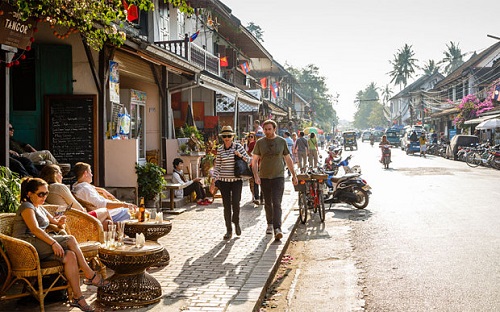Luang Prabang Lures Foreign Investors With Tax Incentives
Source: The Nation
Promoted as one of Laos’ tourism destinations, Luang Prabang is angling for investors from Asean, including Thailand, by offering waiver of corporate income tax for up to six years as bait.
Luang Prabang has prioritised the tourism industry to drive its growth and lift Laotians from poverty under the 2020 strategic development plan, Governor Khamkhan Chamthavisouk said. “In general, Asean investors will be allowed to hold a 100-per-cent stake in companies registered in Luang Prabang.
“They will be also provided with tax exemption on corporate income according to which part of the zones they invest in,” said Siriphone Souphanhthong, director of Luang Prabang’s Department of Planning and Investment. During a seminar on business opportunities in Luang Prabang held on Saturday in the tourist destination, she said the rules and regulations for investment promotion were being improved, focusing on economic and social expansion, similar to Thailand.
The seminar took place during the two-day tour under the Finance Ministry’s Neighbouring Countries Economic Development Cooperation Agency (Neda) of the road construction project from Hongsa in Xayaburi to Chiangman in Luang Prabang.
It was a stage for sharing ideas between officials of Thailand led by Neda chairman Varakorn Samakoses and of Laos led by Luang Prabang Governor Khamkhan Chamthavisouk.
Siriphone anticipates more business matching between Thai and Laotian investors after the completion of the B1.97-billion Hongsa-Chiangman Road in 2018, making travel more convenient from Thailand’s Nan to Luang Prabang.
Construction of the 114-kilometre two-lane paved road was facilitated by a soft loan from the Thai government via Neda.
Travel time from Nan’s Huaykon border checkpoint to Luang Prabang will be shortened to two hours and 30 minutes from five to six hours.
Siriphone said after the seminar that the tax-exemption period would depend on the growth of the city.
Luang Prabang, which is the most developed of the 12 districts of Luang Prabang province, would give a corporate tax waiver for the first two years of operations.
For the remaining districts, seven would grant exemption for four years and four for six years. “However, businesses related to food, hotels and tourism services are still limited.
“Foreign investors are not allowed to hold up to 100 per cent in a tourism-related company and they are required to invest in the form of a joint venture,” she said.
Foreign investors, particularly Thais, could invest in undeveloped areas, but not very far from Luang Prabang’s old city, for the production of organic vegetables and food, souvenirs and packaging to supply to the tourism industry.
As 85 per cent of Luang Prabang’s areas are mountainous, plantations and livestock are suitable.
There would be more privileges such as a waiver on land rent for some years for hospitals and education-related projects.
Today, Luang Prabang is welcoming a Thai delegation led by Somkiat Tangkitvanich, president of the Thailand Development Research Institute, to discuss cooperation between the two nations on economic development.
However, a specific agenda was not set, she added.
Bounthieng Soulivanh, president of the Chamber of Commerce and Industry in Luang Prabang, said there were business opportunities along the Hongsa-Chiangman Road, as Luang Prabang was blessed with plentiful waterfalls, mountains and culture as selling points.
Luang Prabang, which is also a World Heritage Site, would be attractive for trade and investment in the tourism industry.

